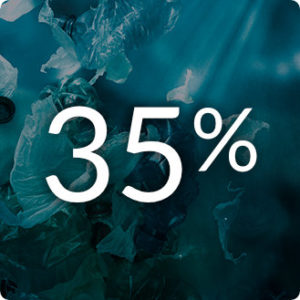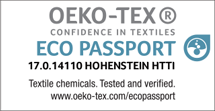Yarns and fabrics made with CiCLO® (pronounced sēklō, translates to cycle) fibers reduce the persistence of plastic microfibers in our oceans and plastic accumulation in landfills.
CiCLO®: Synthetic Fibers for Earth’s Ecosystem

35% of microplastics entering the ocean come via synthetic materials

44 million pounds of synthetic textiles arrive to U.S. landfills each day
*Sources: International Union for Conservation of Nature and United States Environmental Protection Agency
How It Works
CiCLO® fibers have the performance characteristics of traditional plastic-based fibers but behave more like natural fibers if they end up in the environment. Third party laboratory studies using internationally recognized ASTM Test Methods show greatly accelerated rates of biodegradation compared to traditional synthetics in Anaerobic Landfill conditions (ASTM D5511), Sea Water (ASTM D6691) and wastewater treatment plant sludge (ASTM D5210).
Enhanced
Biodegradation
Enhanced Biodegradation
Products made with polyester CiCLO® fibers show greatly enhanced rates of biodegradation versus traditional polyester fibers in the same timeframes.
Sustainability
Insurance
Sustainability Insurance
Until textile recycling at mass is a reality and discarding is no longer customary disposal, textiles made with CiCLO® fibers will become a source of valuable biogas at landfills that utilize biogas for energy.
Ultimate
Sustainability
Ultimate Sustainability
Compatible with recycled raw materials, we encourage the use of CiCLO® in combination with bottle flake for the ultimate sustainable yarn.
Safe
Safe
Chemistry used to make CiCLO® fiber is ECO PASSPORT by OEKO-TEX certified.

Explore CiCLO® Products
Fabrics built with CiCLO® look and wear like any other, and can be engineered with high-performance finishes.
See More